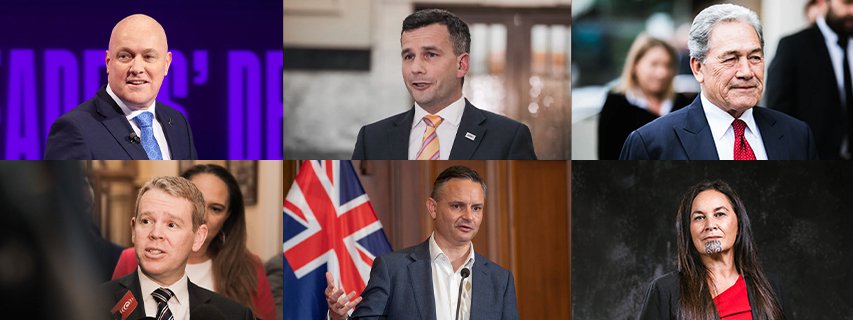
The 2023 General Election will be one for the history books. It reunited the right bloc with electorates lost in the ‘red wave’ of 2020.
We’re nearly there. Special votes will be counted on November 3. These typically favour the left bloc so Labour could pull back some of the narrow losses like Te Atatū or New Lynn. Then coalition talks can begin. The Port Waikato by-election will take place on November 25 creating an extra seat in Parliament. National’s Andrew Bayly is expected to win this seat.
We expect NZ First to be involved in the coalition talks out of necessity, but how might coalition partners influence what comes next? We know cutting waste out of the public service is important to ACT. This is their approach to supporting business, rather than corporate welfare. They have also flagged a referendum on how we interpret Te Tiriti as a bottom line. NZ First will want to support regional New Zealand, so another version of the Provincial Growth Fund could well be on the cards.
Government programmes will be focused on the economy, tax cuts, law and order, and education. Business can also expect a governance structure where the private sector cuts a path for itself and bureaucracy is minimised. This includes the repeal of some key policies such as collective employment agreements and the RMA reform, to name two.
While we know general direction of travel now, the finer points of policy and potential implications will come into focus over the latter weeks of November.
The cost of living is the issue of the day and there will be pressure on the newly formed government to deliver against its election promises of sorting this out.
We know from our Acumen Edelman Trust Barometer that economic anxieties are a key driver for a lack of optimism impacting trust and cohesion in our society. Only 33% of Kiwis think they and their families will be better off in five years’ time. The job to do for the incoming government is to improve this outlook.
A challenge for the National-led government will be to demonstrate it can deliver – and its runway has shrunk. A National-led government will still want to show delivery within its first 100 days, given this was a key criticism it made of the previous government. We can expect action on key campaign issues this side of Christmas – especially those with consensus across the three right bloc parties. Expectant eyes are watching and they won’t want to wait for long.
There is an expectation that this government will be more favourable and willing to engage with the business community and to work more closely together. We know from our trust research that people believe Business and Government working together is more effective than either institution working in isolation.
This is an opportunity for Business to engage proactively – but you need to bring value i.e. how can you help ministers and officials build knowledge? What insights, evidence and experience can you offer to inform better decision-making and policy? The opportunity is to collaborate on policies and standards that deliver results that push Aotearoa toward a more just, secure, and thriving society.
We think there is a job to do for the new government to better connect economic growth with improved social outcomes for New Zealanders. Business is often seen as self-serving, so how do we grow support for a favourable business environment that brings broader societal benefits and opportunities?
Our trust research also shows there is an income-based trust gap between those people in the top and bottom 25% quartiles. This has a destabilising effect on social cohesion. Businesses need to continue to do their bit by paying fair wages, paying fair taxes, training employees and contributing to the communities where they operate. People expect broad-based leadership from business.
The election also highlighted that there is a pocket of voters feeling disenfranchised with the major parties. This group is small statistically, but vocal. This also indicates low or no trust among some in our teams and stakeholder universe, which both Government and Business need to consider in communications and engagement.
Clearly the outcomes of coalition talks are of high interest, but we’re all going to have to wait. It’ll be November before the 54th Government of Aotearoa New Zealand is confirmed – right on the cusp of silly season.
New ministers will need to be briefed on their portfolios by government departments and a Business Committee will be set up at Parliament to agree on a sitting programme for legislation. The last programme doesn’t roll over.
In the meantime, consider how to shape your narrative and story in this rightbloc environment.
You may want to start engaging with non-political stakeholders who will be among the first through the door when new ministers take office. Positions for political staffers are now open.
Continuing to maintain relationships across the House remains important, as today’s Opposition can be tomorrow’s government. And, as we have just seen, don’t overlook the minor parties.